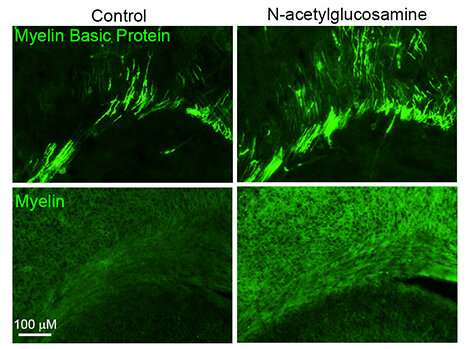Shown are brains of newborn mice treated with or without N-acetylglucosamine by providing their nursing mothers with N-acetylglucosamine in their drinking water. Secreted in breast milk, N-acetylglucosamine entered the brain of nursing mice and stimulated myelin stem cells to promote myelination as measured by increased levels of staining (green) for both myelin basic protein and myelin (fluoromyelin). Credit: UCI School of Medicine
N-acetylglucosamine, a simple sugar found in human breast milk and sold as an over-the-counter dietary supplement in the United States, promotes myelin repair in mouse models and correlates with myelination levels in multiple sclerosis patients according to a new University of California, Irvine-led study.
Published in the Journal of Biological Chemistry, the study also demonstrates that in mice, delivering N-acetylglucosamine orally to lactating mothers drove primary myelination in their nursing offspring. N-acetylglucosamine is a simple sugar that is metabolically attached to proteins at the cell surface to control cellular function.
"We found that N-acetylglucosamine activates myelin stem cells to promote primary myelination and myelin repair," said Michael Demetriou, MD, Ph.D., FRCP(C), professor of neurology, microbiology and molecular genetics at UCI School of Medicine and leader of the study. "Our data raises the intriguing possibility that N-acetylglucosamine may be a simple therapy to promote myelin repair in multiple sclerosis patients". Formal human studies will be required to test this theory.
The failure of robust re-myelination following inflammatory demyelination in multiple sclerosis leads to chronic disability and neurodegeneration. Myelin insulates the long, cable-like nerve cell branches called axons, and serves to increase the speed of electrical signal conduction between neurons. Myelination in the central nervous system also plays an important role in cognitive development during childhood.
"Interestingly, since N-acetylglucosamine is a major component of human breast milk but not baby formula, it may explain some of the cognitive function and myelination benefits realized by children fed breast milk as opposed to formula." said Michael Sy, MD, Ph.D., assistant professor of neurology at UCI School of Medicine, co-director of the regional MS program at the VA Long Beach Healthcare System, and first author of the study.
Dr. med. Alexander Brandt, MD, who led the clinical parts of the study together with Dr. med. Friedemann Paul, MD, added, "The association of reduced N-acetylglucosamine serum levels with white matter changes in the brain of patients with multiple sclerosis suggests that N-acetyglucosamine deficiency may contribute to disease severity."
More information: Michael Sy et al, N-Acetylglucosamine drives myelination by triggering oligodendrocyte precursor cell differentiation, Journal of Biological Chemistry (2020). DOI: 10.1074/jbc.RA120.015595
Journal information: Journal of Biological Chemistry
Provided by University of California, Irvine























